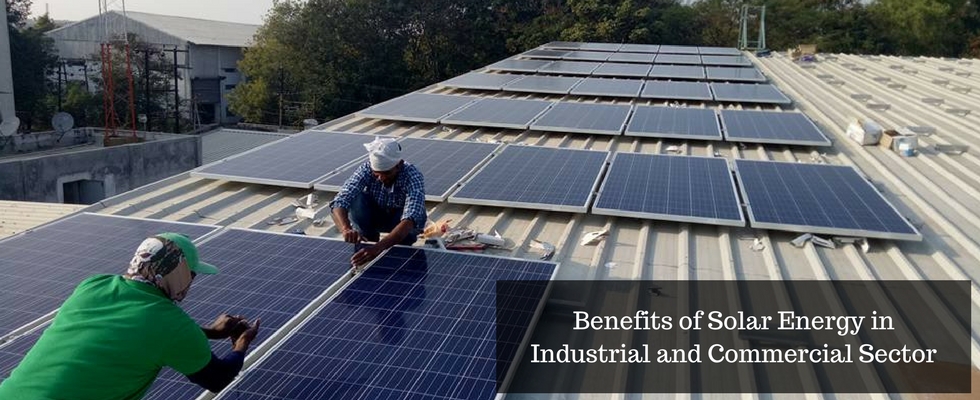Why Industrial and Commercial Sector needs Solar Energy?
Over the time period, solar energy has proved to be the life-changing energy in millions of people across the world. Those who have started to embrace solar panels have found that it can truly cut energy costs. India is one of those countries, who have embraced solar energy and stands fifth in the world of consumption and production. Being a rapidly growing economy country with more than 1 billion people, it is facing a huge energy demand.
Over the years, the production of electricity has expanded and so is the country’s population. To meet the surging demand for energy efficiency, conservation and renewable energy, solar energy is the best form to fulfil the needs of India and bridge the energy demand-supply gap. India being a tropical country receives solar radiation almost throughout the year, which amounts to 3,000 hours of sunshine. As a result, solar energy in India has a tremendous scope. Various sectors such as Industrial, Commercial, Manufacturing, etc. have started to embrace solar energy as a mode of power saving.
Benefits of Solar Energy in Industrial Sectors
The industrial sector is known for processing heat and other thermal applications, which results in a vast potential use of solar energy devices in these sectors. At present, energy used for thermal application by the industrial sector is seen mainly through fuel oil which is not only import dependent but also creates huge GHG emissions in the atmosphere. This in turn result resulting threat to our planet. According to the sources, every year India consumes over 100 million tons of oil, out of which around 40% is being consumed in the industrial sector alone. The industrial sector includes the application like drying and finishing in the textile industry, leaching and distillation in the chemical industry, the cooking, drying and canning in the food industry, drying and cleaning in the leather industry and various such applications in many more industries.
Various types of solar energy can be used for such applications that helps in reducing the consumption of fuel oil largely during the daytime. Solar technologies include air heating systems, steam generating systems and solar water heating systems that are based on a flat plate or colonial tube collectors and automatically tracked solar concentrating collectors.
Based on flat plate collectors, solar air heating systems requires hot air at a low temperature as a process for desiccating various food products. Therefore solar heating systems have found the solar energy to be useful methods in food processing industries. Hot air is not limited to drying food products but is also used in industries like textile, rubber, chemicals, pharmaceuticals, paper and many more. Hence, with the installation of solar energy, industries have started to save a significant amount of fossil fuels apart from improving the quality of end product and reducing GHG emissions.
Benefits of Solar Energy in Commercial Sectors
The choice to go solar for financial perks or environmental reason, there are many business benefits that occur for businesses who embrace solar energy. Much of these perquisites emphasis on what a company will get. However, many benefits also exist in terms of what the company will be able to give back as well.
Talking in terms of price per unit of energy, products like petroleum and coal are highly expensive in today’s time. With the installation of solar energy, the price per unit becomes very less as compare to other energy sources. Another benefit of solar is lack of volatility. For any given time frame it is difficult to predict the prices of electricity and the sudden changes owing to various energy sources that arise due to time. Solar energy helps companies to come out from this liability.
With the help of solar, most of the industries can exist outdoor this capricious system and insulate themselves from outside liabilities. Hence, they can maintain regular operational costs as they relate to energy consumption.
According to the sources, consumers in the commercial and industrial sector will set up 20,000 megawatts of capacity whereas, in the residential, government, institutional, and social sectors will set up 5,000 megawatts of capacity each. Hence, with the installation of solar energy, your solar power system will prolong to satisfy the energy demands unrestrictedly and efficiently for next 25 years to come.



